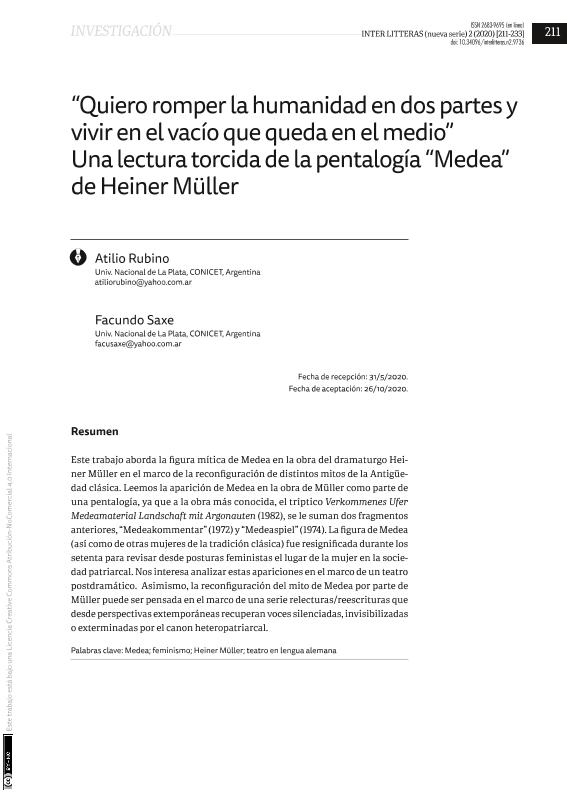Artículo
Este trabajo aborda la figura mítica de Medea en la obra del dramaturgo Heiner Müller en el marco de la reconfiguración de distintos mitos de la Antigüedad clásica. Leemos la aparición de Medea en la obra de Müller como parte de una pentalogía, ya que a la obra más conocida, el tríptico Verkommenes Ufer Medeamaterial Landschaft mit Argonauten (1982), se le suman dos fragmentos anteriores, “Medeakommentar” (1972) y “Medeaspiel” (1974). La figura de Medea (así como de otras mujeres de la tradición clásica) fue resignificada durante los setenta para revisar desde posturas feministas el lugar de la mujer en la sociedad patriarcal. Nos interesa analizar estas apariciones en el marco de un teatro postdramático. Asimismo, la reconfiguración del mito de Medea por parte de Müller puede ser pensada en el marco de una serie relecturas/reescrituras que desde perspectivas extemporáneas recuperan voces silenciadas, invisibilizadas o exterminadas por el canon heteropatriarcal. This paper is about the mythical figure of Medea in the works of german writer Heiner Müller, in the framework of the reconfiguration of different myths from Classical Antiquity. We read the appearance of Medea in Müller’s work as part of a pentalogy, since to the best-known work, the triptych Verkommenes Ufer Medeamaterial Landschaft mit Argonauten (1982), two previous fragments are added, “Medeakommentar” (1972) and “Medeaspiel” (1974). The figure of Medea (as well as other women in the classical tradition) was resignified during the seventies to review from feminist positions the place of women in patriarchal society. We are interested in analyzing these appearances in the framework of a post-dramatic theater. Likewise, Müller’s reconfiguration of the myth of Medea can be thought of within the framework of a series of re-readings / rewrites that from extemporaneous perspectives recover voices silenced, made invisible or exterminated by the hetero-patriarchal canon.
“Quiero romper la humanidad en dos partes y vivir en el vacío que queda en el medio” Una lectura torcida de la pentalogía “Medea” de Heiner Müller
Título:
“I want to break humanity into two parts and live in the emptiness left in the middle”. A feminist reading of Heiner Müller’s “Medea” pentalogy
Fecha de publicación:
30/11/2020
Editorial:
Universidad de Buenos Aires. Facultad de Filosofía y Letras. Instituto de Filología y Literaturas Hispánicas Dr. Amado Alonso
Revista:
Inter Litteras
ISSN:
0328-8935
e-ISSN:
2683-9695
Idioma:
Español
Tipo de recurso:
Artículo publicado
Clasificación temática:
Resumen
Palabras clave:
MEDEA
,
FEMINISMO
,
HEINER MÜLLER
,
TEATRO EN LENGUA ALEMANA
Archivos asociados
Licencia
Identificadores
Colecciones
Articulos(IDIHCS)
Articulos de INST.DE INVEST.EN HUMANIDADES Y CS SOCIALES
Articulos de INST.DE INVEST.EN HUMANIDADES Y CS SOCIALES
Citación
Rubino, Atilio Raúl; Saxe, Facundo Nazareno; “Quiero romper la humanidad en dos partes y vivir en el vacío que queda en el medio” Una lectura torcida de la pentalogía “Medea” de Heiner Müller; Universidad de Buenos Aires. Facultad de Filosofía y Letras. Instituto de Filología y Literaturas Hispánicas Dr. Amado Alonso; Inter Litteras; 2; 30-11-2020; 211-233
Compartir
Altmétricas




